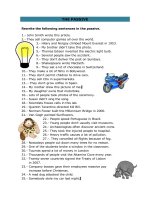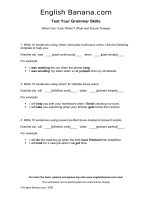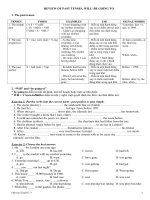present and past tenses revision grammar drills 32138
Bạn đang xem bản rút gọn của tài liệu. Xem và tải ngay bản đầy đủ của tài liệu tại đây (93.27 KB, 20 trang )
Present & Past Tenses
revision
1. We ___________ each other since we were kids.
a)
know
b) have known
c) knew
2. ______________ working as a teacher?
b)
Do you enjoy
b) Are you enjoying
3. Alex is such a whiner –he __________ about his boss for half an hour when we last talked.
c)
has complained
b) complained
c) was complaining
d) had been
complaining
4. Jess _________________for this show for four months and she still isn’t satisfied.
a) had been practicing b) has been practicing c) was practicing
d) had practiced
5. The thief _________ some time around midnight.
a)
broke in
b) was breaking in
c) had broken in
d) has broken in
6. I was disappointed when I realized I _____________ my favourite TV series.
b)
missed
b) was missing
c) have missed
d) had missed
7. I ____________ to lose some weight-do you have any tips?
c)
try
b) am trying
c) tried
d) was trying
8. His day was a disaster-he _____________ at the doctors for three hours before he was admitted.
a) waited
b) was waiting
c) had waited d) had been waiting
9. I don’t want to run into Mark-he _________ money from me!
a)
always borrows
b) has always borrowed
c) is always borrowing
10. ______________ a white deer?
b)
Did you ever see b) Have you ever seen
c) Had you ever seen
11. At the moment we _______ a million pounds to the bank.
c)
are owing b) owe
c) have owed
12. I was asked at the interview if I _________ to have children one day.
a) want
b) have wanted
c) wanted d) will want
Present Simple Tense
verb/ verb + -s/-es
Do /Does … infinitive ?
Do you enjoy working as a teacher?
always, every day/month…, usually, often, sometimes
Present Continuous Tense
am/are/is + verb + -ING
I am trying to lose some weight-do you have any tips?
now, at the moment, currently
Present Perfect Tense
have/ has + past participle
Have you ever seen a white deer?
for, since, ever, never, already, yet, just,
so far, recently
Present Perfect Continuous Tense
have/ has been + verb + -ING
Jess has been practising for this show for four months and she still
isn’t satisfied.
for, since
Past Simple Tense
verb + -d/-ed / II.kolona
Did … infinitive ?
The thief broke in some time around midnight.
in 1999, (2 years) ago, yesterday, last month/ week…
Past Continuous Tense
was/were + verb + -ING
Alex is such a whiner –he was complaining about his boss for half an
hour when we last talked.
For, while
Past Perfect Tense
had + past participle
I was disappointed when I realized I had missed my favourite TV
series.
before, by the time
Past Perfect Continuous Tense
had been + verb + -ING
His day was a disaster-he had been waiting at the doctors for three
hours before he was admitted.
before
Simple
Continuous
Perfect
Perfect
Continuous
Present
Past
She learns often.
She learnt a lot last year.
Does she learn often?
Did she learn a lot last year?
She doesn’t learn often.
She didn’t learn a lot last year.
We are revising tenses now.
We were revising for 3 hours.
Are we revising now?
Were we revising for 3 hours?
We aren’t revising now.
We weren’t revising for 3 hours.
I have visited many countries so far.
I had visited many countries before I retired.
Have I visited many countries so far?
Had I visited many contries before I retired?
I haven’t visited many countries so far.
I hadn’t visited many countries before I retired.
They have been sleeping for hours.
They had been sleeping for hours before we woke them up.
Have they been sleeping for hours ?
Had they been sleeping for hours?
They haven’t been sleeping.
They hadn’t been sleeping.
Is this correct?
1. While Barbara puts in her contact lenses, the telephone rang.
2. Thousands of people will see the art exhibition by the time it closes.
3. By the time negotiations began, many pessimists have expressed doubt about
them.
4. After Capt. James Cook visited Alaska on his third voyage, he is killed by Hawaiian
islanders in 1779.
5. I was terribly disappointed with my grade because I studied very hard.
6. Everyone hopes the plan would work.
7. Harry wants to show his friends the photos he took last summer.
8. The boy insisted that he has paid for the candy bars.
Where is the mistake? (3 verbs)
For the past seven years, I have called myself a swimmer. Swimming, my one sport,
provides a necessary outlet for my abundant energy. I have always drawn
satisfaction from exertion, straining my muscles to their limits. I don't know why
pushing forward in the water, as my muscles cried out in pain, sets off a booming
cheer in my head. Many times when I rounded the turn for the last lap of a race,
my complaining muscles want to downshift and idle to the finish. My mind,
however, presses the pedal to the floor and yells, "FASTER!" The moment that I
touched the wall my muscles relax; the pain subsides. I am pleased to have
passed the point of conflict.
Where is the mistake? (3 verbs)
For the past seven years, I have called myself a swimmer. Swimming, my one sport,
provides a necessary outlet for my abundant energy. I have always drawn
satisfaction from exertion, straining my muscles to their limits. I don't know why
pushing forward in the water, as my muscles cried out in pain, sets off a
booming cheer in my head. Many times when I rounded the turn for the last lap
of a race, my complaining muscles want to downshift and idle to the finish. My
mind, however, presses the pedal to the floor and yells, "FASTER!" The moment
that I touched the wall my muscles relax; the pain subsides. I am pleased to have
passed the point of conflict.
Where is the mistake? (6 verbs)
•
In "The Use of Force" William Carlos Williams describes a struggle involving a doctor, two parents, and their
young daughter. The doctor must obtain a throat culture from the girl, who was suspected of having
diphtheria. This ordinarily simple task is hindered by the frightened and uncooperative patient, Mathilda
Olson. Adding to the doctor's difficulties were the parents, who had to struggle with their own conflicting
emotions. They want their daughter helped, but they did not trust the doctor to do the right thing. Sensitive
to the parents' uncertainty, the doctor became more and more frustrated by Mathilda's resistance. Williams
gives considerable attention to how each of the Olsons react, but it is clear that his main interest was in the
doctor and his responses.
Where is the mistake? (6 verbs)
•
In "The Use of Force" William Carlos Williams describes a struggle involving a doctor, two parents, and their
young daughter. The doctor must obtain a throat culture from the girl, who was suspected of having
diphtheria. This ordinarily simple task is hindered by the frightened and uncooperative patient, Mathilda
Olson. Adding to the doctor's difficulties were the parents, who had to struggle with their own conflicting
emotions. They want their daughter helped, but they did not trust the doctor to do the right thing.
Sensitive to the parents' uncertainty, the doctor became more and more frustrated by Mathilda's
resistance. Williams gives considerable attention to how each of the Olsons react, but it is clear that his
main interest was in the doctor and his responses.
The Mulgray twins
Like many identical twins, Helen i Morna Mulgray usually do many things together. They have always
enjoyed watching the same TV series and reading the same books.
They even chose the same career as teachers.
Now, when they are retired, they have devoted themselves to their mutual hobby-writing. Morna told us
how both of them had spent 31 years working as English teachers and had always been keen on
writing.
The twins published their first crime novel in 2007 and they entitled it “No Suspicious Circumstances”.
Since then, they have published 3 more books. The main characters in all the books are investigator
D.J.Smith and his sidekick, a cat called Gorgonzola.
The Incredible Journey
The Incredible Journey is a story about two dogs and a cat in Canada who found themselves far from their
home. Their owners, the Hunt family, had travelled to England, and they had left the three pets at
their friend’s, Mr Longridge’s, farm. The animals did not understand what had happened and they
paitently waited for the owners to return. After a while they started to think that their owners had
forgotten them. After 2 weeks-during which Mr Longridge had been taking good care of them- they
decided that they had been waiting long enough. They left the farm and started their journey home,
following their instincts. But they did not know that their journey would be 400 kilometres long! When
they finally got home, the animals had been travelling for many weeks and had endured many
difficulties. They had faced starvation, illness, and had been attacked by wild animals. Their owners
were very happy when the pets returned because they had been looking for them during the whole
time.









